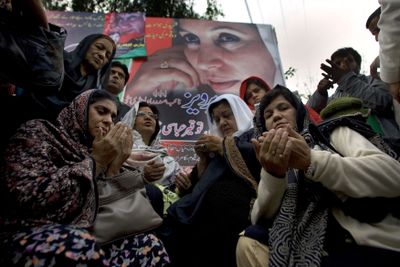Pakistanis mark year since Bhutto’s death
Assassination remains unsolved

KARACHI, Pakistan – With tears, prayers and candlelight vigils, Pakistanis Saturday marked the first anniversary of Benazir Bhutto’s assassination, a killing that stunned the world and came to symbolize the rising Islamic militancy gripping her homeland.
The charismatic former prime minister, Pakistan’s best-known politician, was cut down in a gun-and-bomb attack on Dec. 27, 2007, as she left a campaign rally in the garrison city of Rawalpindi, outside the capital, Islamabad. She was 54.
At somber gatherings across the country, Bhutto was eulogized as a courageous leader who braved assassination threats in returning from exile to lead her party in parliamentary elections aimed at restoring democracy to Pakistan. That vote, held after her death, brought a new civilian leadership to power – an unsteady government led by her widower that is struggling to cope with a burgeoning Islamic insurgency, an economic collapse and fears of war with India.
Tens of thousands of mourners, many of them weeping, beating their chests and flinging rose petals, converged on Bhutto’s ancestral village in southern Sindh province, some trekking for miles on foot to reach the site. They packed the soaring mausoleum that she had built to honor her father, Zulfiqar Ali Bhutto, who was hanged by a military dictator in 1979. It became her tomb as well.
Pakistan’s entire political leadership gathered at the family home nearby, but security threats forced her widower, Asif Ali Zardari, to scrap plans to address the vast crowds at the mausoleum. Zardari took over Bhutto’s Pakistan People’s Party after her death and became the country’s president in September after U.S.-backed former military leader Pervez Musharraf, facing impeachment, stepped aside.
Bhutto’s killing remains unsolved, and at many of the gatherings, there was an undercurrent of anger over the fact that those who orchestrated the assassination have yet to be caught and punished.
The then-government of Musharraf cast the blame on militant leader Baitullah Mehsud, who remains at large in Pakistan’s tribal areas. Many Pakistanis believe elements within the country’s shadowy security apparatus had a hand in Bhutto’s death – a view she espoused herself in a letter written months before she was killed.
The present government has been criticized for failing to carry out a meaningful investigation of Bhutto’s death. On the eve of the anniversary, the country’s leading English-language TV station, Dawn, carried an acerbic report titled “The Probe That Wasn’t.”
Zardari has called on the United Nations to oversee an investigation, something the world body has said it is willing to do. But much crucial evidence is unavailable; no autopsy was carried out, and the assassination scene was cleared and hosed down even before hospital authorities formally announced the death of the Muslim world’s first female prime minister.
In cities across Pakistan, mourners observed a moment of silence at 5:17 p.m., the time when the attack took place. In Bhutto’s birthplace of Karachi, the anniversary revived memories of the devastating suicide attack on her homecoming rally that took place just 10 weeks before her death.
Adnan Sabir Masih, one of the young party activists who had tried to shield Bhutto’s vehicle with his body, spent months recovering from his wounds from that Oct. 18 bombing, which killed more than 150 people. Bhutto escaped unharmed – that time.
“Right at this moment, I would do it again to save her,” Masih said, tears welling in his eyes. “She was a great lady.”